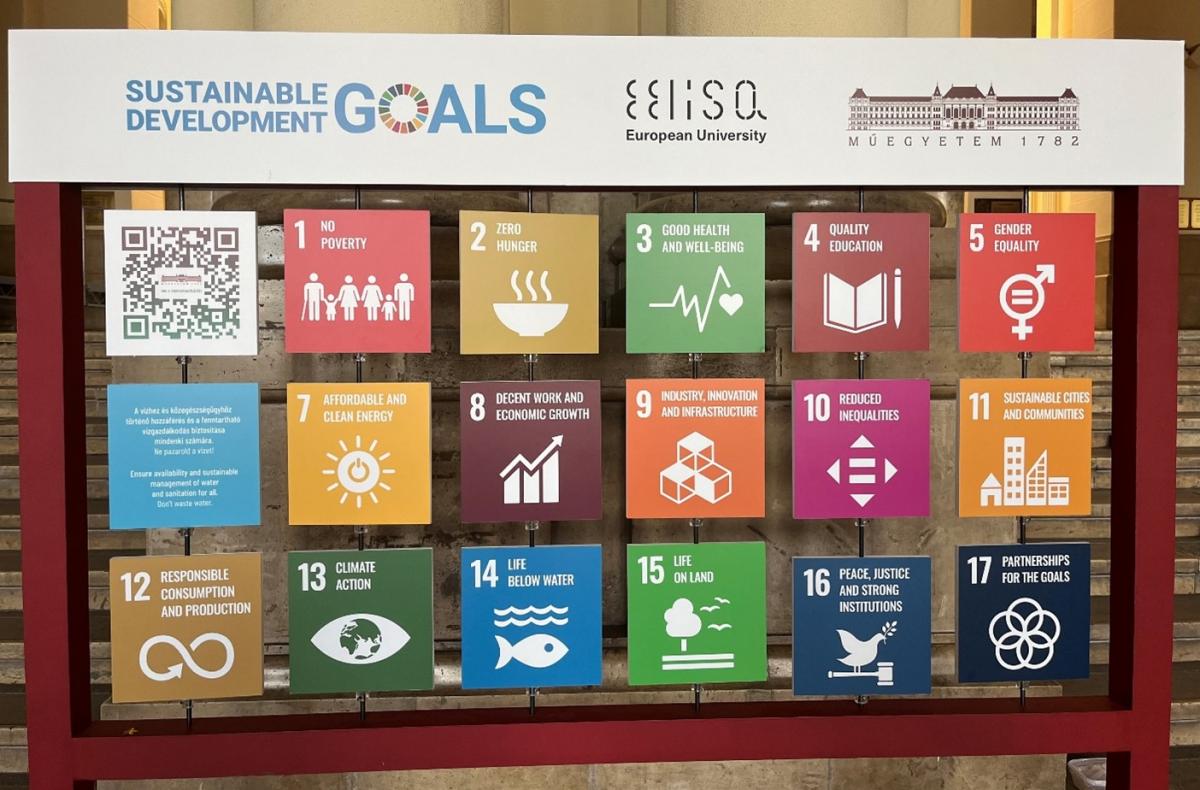News feed
17 goals for a better world – no. 6: Clean water and sanitation for all
2024. 04. 16.Our series of articles entitled “Sustainable Tuesday(s)”, will take a look over 17 weeks at the 17 Sustainable Development Goals (SDGs) set by the UN to make the world a better place.
This time, we take a closer look at goal no. 6: Clean water and sanitation for all, which means to:
Ensure availability and sustainable management of water and sanitation for all.
Don’t waste water!

SDG 6 focuses on sustainable water management, and ensuring access to water and basic sanitation for all.
At the Budapest University of Technology and Economics, a total of 58 subjects, 9 research projects and between 2018 and 2024, according to the SciVal database, 133 international publications can be linked to SDG 6.
At the Faculty of Civil Engineering, the Department of Sanitary and Environmental Engineering and the Department of Hydraulic and Water Resources Engineering are both participating in the ongoing “Clean Drinking Water” project which is being implemented by a national consortium. The research focuses on the entire system supplying the capital’s drinking water, from the Danube to the taps. In addition to basic physical, chemical and microbiological measurements, bacterial communities and antibiotic-resistant organisms that define water quality are also identified, as well as organic micropollutants such as pharmaceutical residues and their decomposition products. Another research project, also within the framework of a national consortium, in which the two above-mentioned departments are also involved, is the ”National Laboratory for Water Science and Water Security (VVNL)” Taking into account Hungary's location and water management, the consortium aims to support the implementation of water science and water safety innovations that will contribute to improving the quality of water resources. Research is carried out under 6 main pillars and within them 40 sub-projects, covering issues related to rivers, lakes, groundwater, urban water management and river basin management. One of the sub-projects led by the Department of Sanitary and Environmental Engineering is dedicated to drinking water technology research: it is aimed at preparing for compliance with the stricter drinking water limits set out in EU Directive 2020/2184, which has been introduced in national legislation in January 2023.
In addition to research on drinking water networks and water treatment technologies, wastewater treatment is also a key research area at the Department of Sanitary and Environmental Engineering. One of the sub-projects of the above-mentioned VVNL project deals with wastewater treatment, and the department is also involved in improving and upgrading the treatment efficiency of several urban wastewater treatment plants. In addition to conventional solutions, decentralised and semi-natural wastewater treatment methods (e.g. dry toilets, compost heaps) are also being studied.
At the Budapest University of Technology and Economics, water supply issues are also a major part of the subjects taught. The Public Works I subject, taught to all civil engineering students, also includes basic knowledge on the design and sizing of drinking water supply systems. Later, within the framework of the sectoral programmes, followed by the specialisations, several subjects cover the design and modelling of public utility networks. Drinking water and wastewater treatment technologies are taught in both the Bachelor’s and Master’s degree programmes; and field trips to drinking water and wastewater treatment plants in the capital are organised as part of an MSc subject. The Urban Drinking Water Supply and Sewerage postgraduate specialist training programme at the Department of Sanitary and Environmental Engineering has a history spanning several decades. At the 2023 TDK conference, an entire section was dedicated to research on clean water and the environment.
At the Department of Applied Biotechnology and Food Science of the Faculty of Chemical Technology and Biotechnology, as well as the Department of Chemical and Environmental Process Engineering, water protection, wastewater treatment technologies, microbial fuel cells, groundwater purification technologies and the environmental toxicology of aquatic micro-pollutants are taught to bioengineers and environmental engineers.
There has been no shortage of events on the subject in recent years. In the framework of the Garden of Wonders competition, jointly launched by BME and Insert Újbuda, a roundtable discussion was held in December 2023 on the potentials of rainwater management. At the November 2022 “BME for Sustainability” conference several presentations addressed water issues. The Faculty of Civil Engineering is actively involved in the work of several professional organisations (Hungarian Hydrological Society, Committee on Water Management of the Hungarian Academy of Sciences, Hungarian Water and Wastewater Technology Association, Hungarian Water Utility Association), and thus contributes to the organisation of various events. Faculty staff have also been involved in organising two major professional days on drinking water safety over the past year. The professional day entitled “Lead in Drinking Water”, held by the Water Quality and Water Technology Section of the Hungarian Hydrological Society and the Budapest Waterworks Company Organisation took place on 11 May 2023 at the Budapest University of Technology and Economics. Another major event, the 17th Drinking Water Safety Professional Day, took place in October 2023, with the active participation of BME.
|
The term SDG stands for the 17 Sustainable Development Goals established by world leaders at the 2015 UN summit to set new directions for global development. In a series of articles called “Sustainable Tuesday(s”, starting today, we will take a look at the 17 Sustainable Development Goals (SDGs) over 17 weeks and show what BME is doing to achieve them, within its own means. You can check out these development goals in a playful way with the help of boards placed at the entrances of the 3 busiest buildings (E, K, Q) on the BME campus. For more information on this topic, you can join the BME GreenHub Facebook group and visit BME’s main website to access our BME for Sustainability platform |
KK (BME Committee on Sustainability)
